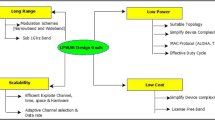Abstract
This paper presents an efficient, battery-powered, low-cost, and context-aware IoT edge computing solution tailored for monitoring a real enterprise cooking oil collecting infrastructure. The presented IoT solution allows the collecting enterprise to monitor the amount of oil deposited in specific barrels, deployed country-wide around several partner restaurants. The paper focuses on the specification, implementation, deployment and testing of ESP32/ESP8266-based end-node components deployed as an edge computing monitoring infrastructure. The achieved low-cost solution guarantees more than a year of battery life, reliable data communication, and enables automatic over-the-air end-node updates. The open-source software libraries developed for this project are shared with the community and may be applied in scenarios with similar requirements.
Access this chapter
Tax calculation will be finalised at checkout
Purchases are for personal use only
Similar content being viewed by others
References
Al-Naamany, A.M., Meribout, M., Al Busaidi, K.: Design and implementation of a new nonradioactive-based machine for detecting oil–water interfaces in oil tanks. IEEE Trans. Instrum. Meas. 56(5), 1532–1536 (2007)
Bellavista, P., Berrocal, J., Corradi, A., Das, S.K., Foschini, L., Zanni, A.: A survey on fog computing for the Internet of Things. Pervasive Mob. Comput. 52, 71–99 (2019)
Espressif Systems. ESP8266EX Datasheet, Version. 6.2, August 2019
Flores-Cortez, O.O., Adalberto Cortez, R., Rosa, V.I.: A low-cost IoT system for environmental pollution monitoring in developing countries. In: 2019 MIXDES - 26th International Conference “Mixed Design of Integrated Circuits and Systems”, pp. 386–389, June 2019
Lagerqvist, A., Lakshminarayana, T.: IoT latency and power consumption: measuring the performance impact of MQTT and CoAP. Master’s thesis, Jönköping University, JTH, Computer Science and Informatics (2018)
Mesquita, J., Guimarães, D., Pereira, C., Santos, F., Almeida, L.: Assessing the ESP8266 WiFi module for the Internet of Things. In: 2018 IEEE 23rd International Conference on Emerging Technologies and Factory Automation (ETFA), vol. 1, pp. 784–791, September 2018
ISUS: Intelligent Sensing and Ubiquitous Systems. ESP operation mode management library (2019). https://code.ufp.pt/bruno.gomes/esp_fast_connect
Shahzad, K., Oelmann, B.: A comparative study of in-sensor processing vs. raw data transmission using ZigBee, BLE and Wi-Fi for data intensive monitoring applications. In: 2014 11th International Symposium on Wireless Communications Systems (ISWCS), pp. 519–524, August 2014
Shelby, Z., Frank, B., Sturek, D.: Constrained application protocol (CoAP). In: IETF Internet-Draft draft-ietf-core-coap-08, Work in Progress (2011). http://tools.ietf.org/html/draft-ietf-core-coap-08
Spanó, E., Di Pascoli, S., Iannaccone, G.: Low-power wearable ECG monitoring system for multiple-patient remote monitoring. IEEE Sens. J. 16(13), 5452–5462 (2016)
Tuan Tran, M.A., Le, T.N., Vo, T.P.: Smart-config WiFi technology using ESP8266 for low-cost wireless sensor networks. In: 2018 International Conference on Advanced Computing and Applications (ACOMP), pp. 22–28, November 2018
Acknowledgements
This work was funded by Project P-FECFP-HARDLEVEL-ISUS0001-2018 supported under the scope of a protocol established between Hardlevel - Energias Renováveis Lda and Fundação Ensino e Cultura Fernando Pessoa, represented here by its R&D group Intelligent Sensing and Ubiquitous Systems (ISUS).
Author information
Authors and Affiliations
Corresponding author
Editor information
Editors and Affiliations
Rights and permissions
Copyright information
© 2020 The Editor(s) (if applicable) and The Author(s), under exclusive license to Springer Nature Switzerland AG
About this paper
Cite this paper
Gomes, B. et al. (2020). A Power Efficient IoT Edge Computing Solution for Cooking Oil Recycling. In: Rocha, Á., Adeli, H., Reis, L., Costanzo, S., Orovic, I., Moreira, F. (eds) Trends and Innovations in Information Systems and Technologies. WorldCIST 2020. Advances in Intelligent Systems and Computing, vol 1160. Springer, Cham. https://doi.org/10.1007/978-3-030-45691-7_11
Download citation
DOI: https://doi.org/10.1007/978-3-030-45691-7_11
Published:
Publisher Name: Springer, Cham
Print ISBN: 978-3-030-45690-0
Online ISBN: 978-3-030-45691-7
eBook Packages: Intelligent Technologies and RoboticsIntelligent Technologies and Robotics (R0)




